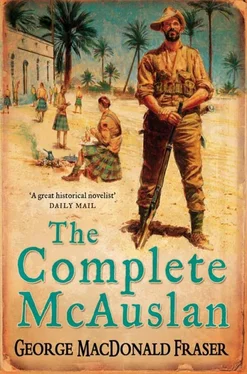Next morning in his office, before despatching me to a company, he gave me sound advice, much of which passed me by although I remembered it later.
“You’ve been in the ranks. Good. That”—and he pointed to my Burma ribbon—“will be a help. Your Jocks will know you’ve been around, so you may be spared some of the more elementary try-ons. I’m sending you to D Company—my old company, by the way.” He puffed at his pipe thoughtfully. “Good company. Their march is ‘The Black Bear’, which is dam’ difficult to march to, actually, but good fun. There’s a bit where the Jocks always stamp, one-two, and give a great yell. However, that’s by the way. What I want to tell you is: get to know their names; that’s essential, of course. After a bit you’ll get to know the nicknames, too, probably, including your own. But once you know their names and faces, you’ll be all right.”
He hummed on a bit, and I nodded obediently and then took myself across to D Company office, where the company commander, a tall, blond-moustached Old Etonian named Bennet-Bruce, fell on me with enthusiasm. Plainly D Company, and indeed the entire battalion, had just been waiting a couple of centuries for this moment; Bennet-Bruce was blessed above all other company commanders in that he had got the new subaltern.
“Splendid. Absolutely super. First-class.” He pumped me by the hand and shouted for the company clerk. “Cormack, could you find another cup for Mr MacNeill? This is Cormack, invaluable chap, has some illicit agreement with the Naafi manager about tea and excellent pink cakes. Mr MacNeill, who has joined our company. You do take sugar? First-class, good show.”
I had been in the army quite long enough not to mistake Bennet-Bruce for just a genial, carefree head-case, or to think that because he prattled inconsequentially he was therefore soft. I’d seen these caricature types before, and nine times out of ten there was a pretty hard man underneath. This one had the Medaille Militaire, I noticed, and the French don’t hand that out for nothing.
However, he was making me at home, and presently he wafted me round the company offices and barrack-rooms on a wave of running commentary.
“Company stores here, presided over by Quartermaster Cameron, otherwise known as Blind Sixty. Biggest rogue in the army, of course, but a first-class man. First-class. Magazine over there—that’s Private Macpherson, by the way, who refuses to wear socks. Why won’t you wear socks, Macpherson?”
“Ma feet hurt, sir.”
“Well, so do mine, occasionally. Still, you know best. Over yonder, now, trying to hide at the far end of the corridor, that’s McAuslan, the dirtiest soldier in the world. In your platoon, by the way. Don’t know what to do with McAuslan. Cremation’s probably the answer. Nothing else seems to work. Morning, Patterson, what did the M.O. say?”
“Gave me some gentian violent, sir, tae rub on.”
“Marvellous stuff,” said Bennet-Bruce, with enthusiasm. “Never travel without it myself. Now, let’s see, Ten platoon room over there, Eleven in there, and Twelve round there. Yours is Twelve. Good bunch. Good sergeant, chap called Telfer. Very steady. Meet him in a minute. No, Rafferty, not like that. Give it here.”
We were at a barrack-room door, and a dark, wiry soldier at the first bed was cleaning his rifle, hauling the pull-through along the barrel. “Not like that,” said Bennet-Bruce. “Pull it straight out, not at an angle, or you’ll wear away the muzzle and your bullets will fly off squint, missing the enemy, who will seize the opportunity to unseam you, from nave to chaps.” He tugged at the pull-through. “What the hell have you got on the end of this, the battalion colours?”
“Piece of four-by-two, sir,” said Rafferty. “An’ a bit o’ wire gauze.”
“Who authorised the gauze?”
“Eh, At got it fae the store,” said Rafferty uneasily.
“Take it back,” said Bennet-Bruce, “and never, never use it without the armourer’s permission. You know that, don’t you? Next time you’ll be in company office. Carry on. I really do despair, sometimes. Morning, Gray. Morning, Soutar. Now, let’s see.” He stopped at the company notice-board. “‘Team to play A Company’. Good God, you’ve got me on the right wing, Corporal Stevenson. That means that Forbes here will bully and upbraid me through the entire game. I don’t really think we’re the best thing since Matthews and Carter, do you, Forbes?”
“Just stay on yer wing,” said the saturnine Forbes. “Ah’ll pit the ba’ in front of you.”
“Well, I rely on you,” said Bennet-Bruce, passing on. “That chap Forbes is a marvellous footballer,” he went on to me. “Signed by Hearts, I understand. You play football? Good show. Of course, that’s the great game. The battalion team are district champions, really super team they are, too. Morning, Duff …”
And so on. Bennet-Bruce was at home. Finally, he introduced me to Sergeant Telfer, a sturdy, solid-looking man in his mid-thirties who said very little, and left us to get acquainted. This consisted of going over the nominal roll, meeting the corporals, and making polite remarks on my part; obviously if I didn’t make the running we would have long silences. However, it seemed to be going well enough for a start.
Next day came that first inspection, and after that the routine drills and exercises, and learning people’s names, and getting into the company routine. I worked rather cautiously, by the book, tried a joke or two without response, and told myself it was early days yet. They were a better platoon than I had expected; they were aged round about twenty, a year younger than I was, they were good on drill, did a fifteen-mile route march in five hours without any sign of distress, and on the rifle range were really impressive. But they were not what could be called forthcoming; off parade they were cheery enough with each other, but within my orbit they fell quiet, stolid and watchful.
As I say, I don’t know what I expected, but I began to feel depressed. There was something missing; they did what they were told smartly—well, fairly smartly; they took no liberties that I noticed. But if they didn’t dislike me they certainly didn’t seem to like me either. Perhaps it was my fault; they were happy enough with Bennet-Bruce and any other company officers who came into contact with them. I envied Macmillan, the subaltern of Ten platoon, who had been in the battalion about six months and abused his platoon good-naturedly one minute and tore strips off them the next; they seemed to get on with him. I wondered if I was the Tiberius type (“let them hate me so long as they fear me”), and concluded I wasn’t; it seemed more likely that the Selection Board who took me out of the ranks had just been wrong.
In the mess things went fairly well until one evening I knocked a pint glass accidentally off the arm of a chair, and a liverish major blasted my clumsiness and observed that there were only about half a dozen of those glasses left. I apologised, red-faced but faintly angry; we looked at each other with mutual dislike, and the trivial incident stuck in my mind. Other things were prickling vaguely, too; my service dress wasn’t a good fit, and I knew it. I suspected (wrongly) that this gave rise to covert amusement and once this tiny seed had taken root I was halfway to seeing myself as a laughing-stock.
This can be a dreadful thing to the young, and not only the young. In no time at all I was positive that my platoon found me faintly ridiculous; occasionally I caught what I thought was a glint of amusement in an eye on parade, or heard a stifled laugh. I would tell myself I just imagined these things, but then the doubts would return.
One morning there was a platoon rifle inspection, and I must have been on the down-swing, because I went on it half-conscious of a resolve to put somebody on a charge for something. This, of course, was a deplorable attitude. I had never charged anyone yet, and I may have felt that I ought to, pour encourager the platoon in general. Anyway, when I came to a rifle in the middle rank that seemed to have dirt in the grooves of the barrel, I nailed its owner.
Читать дальше












